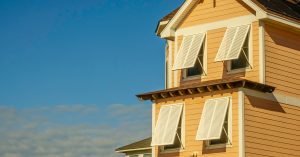“Hurricane Shutter Policies Raise Questions” – News-Press

A: It depends on the local codes and ordinances regulating the home, and the terms of your association’s governing documents. The Florida Fire Prevention Code and the Florida Building Code are interrelated statutes governing construction and life safety systems for the protection of all Florida residents and emergency personnel. These laws do not include a deadline by which shutters must be removed following a storm or distinguish between occupied and unoccupied dwellings.
Local codes and ordinances may also come into play. For example, Section 6-115(d)(2)b of the Lee County Land Development Code prohibits the “boarding up” of windows, including by hurricane shutters or plywood, except when deployed for a pending storm, and must be removed within 30 days after the storm passes. Where windows are covered for more than 30 days, it is considered a public nuisance in violation of the Code. However, the Lee County Code does not expressly distinguish between occupied and unoccupied dwellings.
By comparison, Section 2-1-44 of the Charlotte County Code of Ordinances was amended in 2018 to provide that an owner is not prohibited from leaving permitted storm shutters, panels, or other approved hurricane protection devices on the windows of a structure that is unoccupied. Further, the Charlotte County Code provides that unpermitted storm shutters may remain on a residential or commercial structure up to 30 days after the end of hurricane season.
There may be a general “unlawful use” prohibition in your governing documents, which would prohibit uses that violate local laws. Additionally, your association’s governing documents may also address hurricane shutter deployment requirements, which may be stricter than local ordinance and would govern.
This is often a controversial issue in communities. Some argue that if they are away during hurricane season, they have no realistic way to protect their property against storm damage unless the shutters are left in the closed position while they are away. Others argue that rampant closed shutters make the community look “abandoned” and is both aesthetically displeasing and an invitation to criminals. Fair points on both sides of the coin.
When shutters are closed, emergency responders may not know if a dwelling is unoccupied and may try to gain entry to rescue occupants, even though the home is empty. I have also been told that hurricane shutters may also trap heat and smoke inside the structure, making it harder for emergency responders to get inside, and more dangerous when they do.
This is a tough issue and one that is best to “lawyer up” on. You need to know how your local laws come into play. You also need to know if this is an issue that can be addressed through a board rule or whether a declaration amendment is required. You also need to understand what your options and procedures would be for enforcing a regulation. For example, I remember reading a condominium arbitration decision many years ago that found a board rule to be unreasonable, stating that if the board wanted to require shutters to be left open, the association would need to be responsible to deploy them in the event of an approaching storm.
Arbitration decisions are not “the law” but rather an opinion of one attorney, in one dispute, and are not entitled to judicial deference under the Florida Constitution. But again, there are many factors that should be taken into account and in the condominium context, this would be one of them.
It would also be helpful to speak to your insurers and ask for their input and recommendations, since there are both life and property safety plusses and minuses.
Joseph Adams is a Board Certified Specialist in Condominium and Planned Development Law, and an Office Managing Shareholder with Becker & Poliakoff. Katie Berkey is a Board Certified Specialist in City, County and Local Government Law and a certified Professional Planner by the American Institute of Certified Planners; she is also a shareholder with Becker & Poliakoff.
Please send your community association legal questions to jadams@beckerlawyers.com. Past editions of the Q&A may be viewed at floridacondohoalawblog.com.





